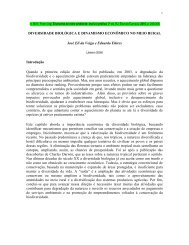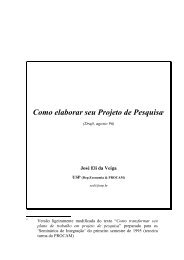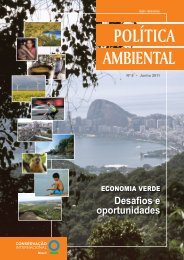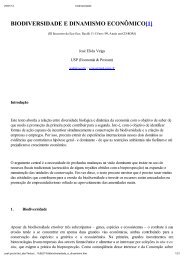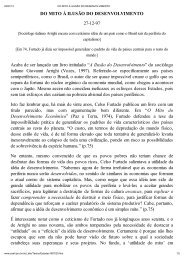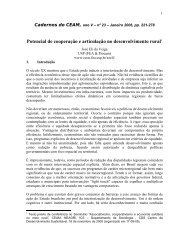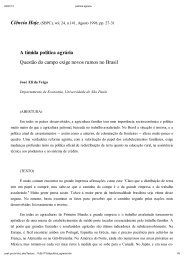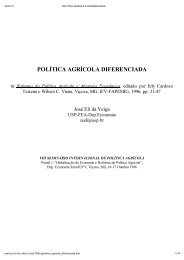sustainable development 20 years on from the ... - José Eli da Veiga
sustainable development 20 years on from the ... - José Eli da Veiga
sustainable development 20 years on from the ... - José Eli da Veiga
You also want an ePaper? Increase the reach of your titles
YUMPU automatically turns print PDFs into web optimized ePapers that Google loves.
182<br />
strategies, develop mechanisms for regi<strong>on</strong>al collaborati<strong>on</strong>, identify sources of internati<strong>on</strong>al assistance and<br />
streng<strong>the</strong>n <strong>the</strong> legal authority for enforcement. The lack of basic <strong>da</strong>ta and/or statistics for developing<br />
<str<strong>on</strong>g>sustainable</str<strong>on</strong>g> <str<strong>on</strong>g>development</str<strong>on</strong>g> indicators, insufficient understanding of indicators and <strong>the</strong>ir applicati<strong>on</strong> in<br />
decisi<strong>on</strong>-making, lack of political will, lack of financial and human resources and a decrease in official<br />
<str<strong>on</strong>g>development</str<strong>on</strong>g> assistance are all major barriers to <strong>the</strong> successful <str<strong>on</strong>g>development</str<strong>on</strong>g> and implementati<strong>on</strong> of such<br />
strategies (ECLAC, <str<strong>on</strong>g>20</str<strong>on</strong>g>10b).<br />
2. United Nati<strong>on</strong>s Framework C<strong>on</strong>venti<strong>on</strong> <strong>on</strong> Climate Change<br />
Vulnerability to climate change is a major challenge for SIDS and <strong>on</strong>e of <strong>the</strong>ir key comm<strong>on</strong> issues.<br />
Caribbean SIDS have made c<strong>on</strong>siderable progress in addressing <strong>the</strong> challenges of climate change and<br />
implementing <strong>the</strong> United Nati<strong>on</strong>s Framework C<strong>on</strong>venti<strong>on</strong> <strong>on</strong> Climate Change (<strong>the</strong> Climate Change<br />
C<strong>on</strong>venti<strong>on</strong>). Nati<strong>on</strong>al communicati<strong>on</strong>s to <strong>the</strong> C<strong>on</strong>venti<strong>on</strong> secretariat 2 include a first report sent by all<br />
Caribbean SIDS beginning in <str<strong>on</strong>g>20</str<strong>on</strong>g>00 and a sec<strong>on</strong>d report sent by Antigua and Barbu<strong>da</strong>, Belize, <strong>the</strong><br />
Dominican Republic and Jamaica. Some key areas of progress are listed below:<br />
(i) Greenhouse gas emissi<strong>on</strong>s reporting. Most Caribbean SIDS have established climate change<br />
committees resp<strong>on</strong>sible for overseeing <strong>the</strong> preparati<strong>on</strong> of nati<strong>on</strong>al communicati<strong>on</strong>s under <strong>the</strong><br />
Climate Change C<strong>on</strong>venti<strong>on</strong>. In additi<strong>on</strong>, Caribbean SIDS have calculated anthropogenic<br />
greenhouse gas emissi<strong>on</strong>s and removal by sinks, following <strong>the</strong> Revised 1996 Guidelines for<br />
Nati<strong>on</strong>al Greenhouse Gas Inventories of <strong>the</strong> Intergovernmental Panel <strong>on</strong> Climate Change.<br />
(ii) Climate modelling. An <strong>on</strong>going collaborative climate modelling effort by <strong>the</strong> Institute of<br />
Meteorology of Cuba, <strong>the</strong> Caribbean Community Climate Change Centre and M<strong>on</strong>a and<br />
Cave Hill Campuses of <strong>the</strong> University of <strong>the</strong> West Indies has published climatic temperature<br />
and precipitati<strong>on</strong> projecti<strong>on</strong>s that have enabled Caribbean SIDS to plan for a<strong>da</strong>ptati<strong>on</strong> to and<br />
mitigati<strong>on</strong> of climate change. The activities of <strong>the</strong> Water Centre for <strong>the</strong> Humid Tropics of<br />
Latin America and <strong>the</strong> Caribbean have complemented this work for <strong>the</strong> Dominican Republic<br />
(and Mesoamerica) by assessing <strong>the</strong> vulnerability of ecosystems and <strong>the</strong>ir c<strong>on</strong>stituent species<br />
to climate change (UNEP, <str<strong>on</strong>g>20</str<strong>on</strong>g>08). There are also new opportunities for climate research in <strong>the</strong><br />
regi<strong>on</strong> through <strong>the</strong> Coordinated Regi<strong>on</strong>al Climate Downscaling Experiment (CORDEX)<br />
(ECLAC, <str<strong>on</strong>g>20</str<strong>on</strong>g>10a), which was initiated in <str<strong>on</strong>g>20</str<strong>on</strong>g>10 and is expected to generate new and more<br />
abun<strong>da</strong>nt informati<strong>on</strong> for climate change projecti<strong>on</strong>s and planning. Building climate<br />
modelling capacity across <strong>the</strong> regi<strong>on</strong> will help raise awareness and enhance <strong>the</strong> ability of<br />
States to c<strong>on</strong>sider a<strong>da</strong>ptati<strong>on</strong> and mitigati<strong>on</strong> opti<strong>on</strong>s with a view to effective policy<br />
<str<strong>on</strong>g>development</str<strong>on</strong>g> and strategic acti<strong>on</strong> aligned with <strong>the</strong> Climate Change C<strong>on</strong>venti<strong>on</strong> and<br />
Caribbean challenges.<br />
(iii) A<strong>da</strong>ptati<strong>on</strong>. Given <strong>the</strong>ir low c<strong>on</strong>tributi<strong>on</strong>s to global greenhouse gas emissi<strong>on</strong>s, Caribbean<br />
SIDS have prioritized a<strong>da</strong>ptati<strong>on</strong> in mitigating climate change effects (Trotz, <str<strong>on</strong>g>20</str<strong>on</strong>g>08; UNDESA,<br />
<str<strong>on</strong>g>20</str<strong>on</strong>g>10a). The majority of Caribbean SIDS have participated in <strong>the</strong> Global Envir<strong>on</strong>ment<br />
Facility-funded Caribbean Planning for A<strong>da</strong>ptati<strong>on</strong> to Climate Change (CPACC) project and<br />
its ensuing initiatives, which include Mainstreaming A<strong>da</strong>ptati<strong>on</strong> to Climate Change,<br />
A<strong>da</strong>ptati<strong>on</strong> to Climate Change in <strong>the</strong> Caribbean and <strong>the</strong> Special Programme for A<strong>da</strong>pting to<br />
Climate Change. Under <strong>the</strong> CPACC project, countries formulated initial a<strong>da</strong>ptati<strong>on</strong> policies,<br />
2<br />
Nati<strong>on</strong>al communicati<strong>on</strong>s and reports <strong>from</strong> n<strong>on</strong>-Annex I parties [<strong>on</strong>line] http://unfccc.int/nati<strong>on</strong>al_reports/n<strong>on</strong> annex_<br />
i_natcom/items/2979.php [<strong>da</strong>te of reference: December <str<strong>on</strong>g>20</str<strong>on</strong>g>11].



